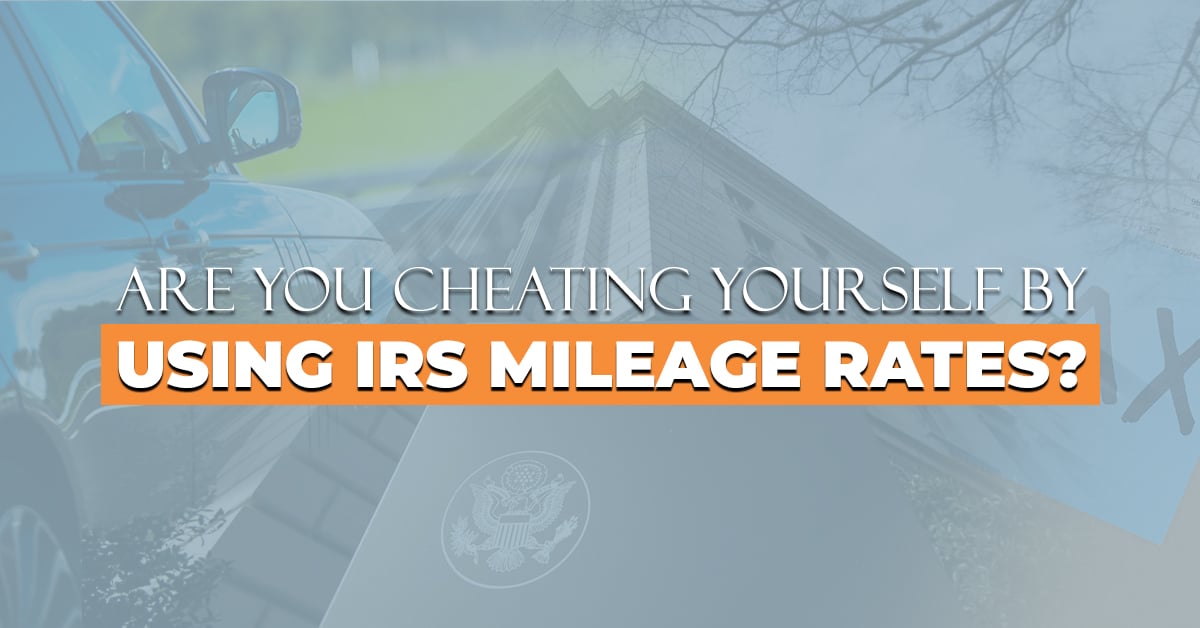Are You Cheating Yourself by Using IRS Mileage Rates?

Are you using the standard IRS mileage rates for your business travels?
Did you even know there was another option?
The good news is that there is, and it might just be a better way to go when it comes to your business vehicle and mileage expenses. Some people aren’t aware that the actual expense method exists. Others may assume that it’s too much work for the “minimal” savings they might find—but those savings could be in the thousands of dollars, so it might be time to reassess your methods and reconsider alternatives to standard deductions.
IRS mileage rates are expensed and reported one year at a time. That’s somewhat problematic because you don’t use a vehicle for business one year at a time—you use it from the time you buy it until the time you trade it in or acquire a new business vehicle. Wouldn’t it make sense to claim expenses for your vehicle over its lifespan instead of one year at a time?
Taking standard mileage rate deductions year after year could cost you thousands, or even tens of thousands, over the lifetime of the vehicle. Using the actual expense method calculates things like depreciation, actual value, and mileage rates based on the entire lifespan of the vehicle, not just each year for which you file taxes.
Who Qualifies for IRS Mileage Rates?
While it’s available to many, not everyone will be eligible to use the IRS standard mileage rates. Those who are automatically ineligible include companies that:
- Have five or more vehicles operating at the same time
- Lease vehicles and don’t use the standard rates for the full lease term
- Claim Section 179 expensing for their vehicles
- Claim depreciation outside of straight-line depreciation
- Use the vehicle while working as a USPS employee doing rural route delivery
There are two other major rules regarding the use of IRS mileage rates in business:
- Corporations: Any incorporated business may not use mileage rates for corporate-owned vehicles. However, the IRS standard mileage rate can be used to reimburse employees for business use of their personal vehicles.
- Partnerships: Based on the rule that partners cannot deduct expenses related to their business partnership on their income taxes, the standard IRS mileage rate cannot be used on partnership vehicles. The exception is that if partners are required to pay for certain expenses out of their own money, they can claim Section 162 deductions for self-employment, which allows them to use the standard mileage rate.
Anyone who isn’t sure whether they are permitted to use the IRS standard mileage rate (or whether they should consider the actual expense method) should consult their accountant or another financial professional. They can help you determine what is in the best interests of the business.
Standard Mileage vs. Actual Expense Method
To help you better understand how these two methods vary and what money you could be missing, let’s look at an example. In 2022, the IRS mileage rates were:
- 5 cents per mile (1/1-6/30)
- 5 cents per mile (7/1-12/31)
If you purchased a $50,000 SUV and drove it for about 15,000 miles, 87% of which were for business, the mileage method would reimburse you for mileage only. If you own the vehicle for three years, that works out to just over $5,700 in after-tax losses when compared to taking the actual expense method.
We’ll save you the confusion of all the accounting math, but you can find several online calculators to help you compare IRS vs. actual expenses and use that information to determine how to proceed with your vehicle expensing. What’s the difference? Well, instead of only calculating mileage and allowing for standard depreciation, the actual expense method:
- Figures in Section 179 deduction, bonus depreciation, standard depreciation, and all ownership costs for the full (three-year) ownership period.
- Figures the mileage rate deductions throughout the three-year period.
- Calculates the standard IRS mileage rate depreciation.
- Computes the total gain or loss (a gain with the expense method, significant loss with the standard IRS deduction).
- Applies all necessary and appropriate tax rates to deductions, losses, and gains.
Essentially, with the actual expense method, you’re maximizing your deductions for the business use of your vehicle, rather than settling for the standard IRS mileage rates. The latter may seem easier, but with a qualified tax accountant on your side, you can take advantage of the more detailed actual expense option to see how much you stand to gain.
Can You Switch Methods Once You Start?
Of course, you’re probably now wondering whether you can switch your methodology since you’ve learned that you might have better options. If you started with the actual expense method, that’s going to be the method used until you no longer own the vehicle.
However, if you started with the standard mileage deduction, you could change to the actual expense method as long as you meet one of the qualifications for the IRS special rules, which you can find on the IRS website for Business Use of Cars. Make sure that you understand the rules for filing properly, or that you have a tax accountant who can prepare your business taxes with the appropriate deductions and expenses for business vehicles and other equipment or business property that you own.
The Takeaway
The IRS would like you to think that they’re nice enough to cover mileage for business purposes and that it’s for your benefit—but as you can see, it’s sometimes just enough of a benefit to prevent people from asking questions and when you stop to look, there’s a better way. Granted, there will be some people who still benefit from standard deductions, but that’s usually rare.
If you want to maximize your business deductions and expensing, make sure that you know the best ways to file your business taxes and handle expense reporting. To learn more about how much you could be missing out on with vehicle expensing or get help with other financial matters, contact the Jones CPA Group today.






